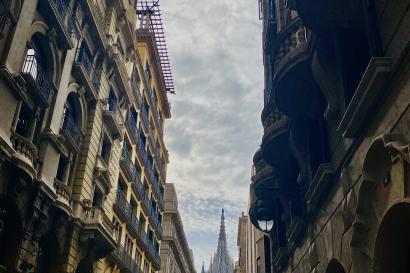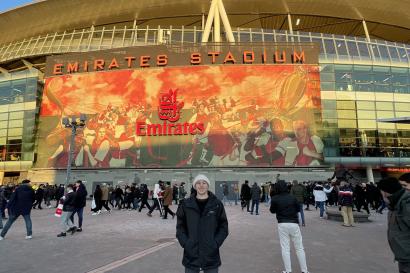
Americans have a soft spot for revolutionaries, for freedom fighters, for the mothers and fathers of liberty. It is ingrained in our blood no less than the stripes and stars themselves. Thomas Jefferson urged for a revolution with each new generation. Every fifth grader from Virginia to Nebraska has heard Patrick Henry’s famous ultimatum, demanding either liberty or death. At a Libertarian debate, Presidential Nominee Gary Johnson was booed for agreeing that drivers should be required to obtain a license prior to operating a motor vehicle. “What’s next,” one candidate responded, “requiring a license to make toast in your own damn toaster?”
The Catalonians do not celebrate their independence day with fireworks and hotdog eating contests, for in their eyes, they are still entrapped under the yoke of tyranny. The day they celebrate is September 11th, 1714, a day not of victory but of defeat to the Bourbon Dynasty Forces, a commemoration of Catalan’s annexation to the Spanish Crown.
Many today are still longing for true freedom and find unique and subtle ways to push back against their captors. Yellow ribbons are hung and Catalonian flags are waived. They speak their own language and chant “i-n-d-e-p-e-n-d-e-n-c-e” at soccer games. They change street signs and hold their own elections.
In 2017, they had an election, one for the Catalan independence referendum. “Do you want Catalonia to become an independent state in the form of a republic?” 2,044,038 people said yes, a sweeping 92% voters. Perhaps even more would have agreed if police were not suppressing polling, forcibly at times.
This is, of course, only what the protestors want you to know. The truth is that the majority of Catalonians want to remain a part of Spain. Only 8% voted against independence because the Spanish government had declared the vote to be an illegal act and urged citizens not to participate. Those who helped organize the election were jailed, sparking more unrest from those 2million+ who remain loyal to the cause.
The Catalonians who are content with their region’s political status also participate in the festivities of Catalonia’s national day. They enjoy celebrating their heritage with marches, drums, and Castellers (human towers) but balk at rallying cries for succession.
“Succession” carries with it a different connotation to my American ears than does “revolution.” Of our two great domestic wars, the latter is viewed with pride and honor while the former arouses sentiments of remorse and shame. We castigate the British but praise the North, decry the Southerners but glorify the Yankees.
Uncompelled by ideology, I tried to observe what was occurring on the ground. I understand the local language less than the average Catalan Sheepdog, so speeches and chants did little to clarify my confusion. Instead, I focused on smiling faces, on songs and dances, on fierce flag waving and tame, welcoming fires. Drummers lead marches through the streets, children laughed and played, teenagers rocked out at concerts, even the elderly held signs and cheered. It was warm and beautiful and distinctly Catalan.
________
“When do you think it’s actually going to start?” The two American girls I met standing on the street corner are growing impatient. Apparently they’ve forgotten that Anarchists don’t conform to social norms like punctuality. The protest was supposed to start an hour ago, but so far all we’ve seen are blue hair cuts and eyebrow piercings getting stopped and searched by incredulous police.
“Wait, should we put this on our story?” One pulls out her phone and starts recording their two smiling faces with a background of a few hundred locals loitering behind. “Sooooo, we’re here at the riot!! Posing with the po-po!” They giggle, then frown when they check the lighting and commence take 2 of 4.
A shriek. Followed by a yelp. Feet rushing. Feet rushing. Screams.
I jerk my head left and see the commotion has picked up. I rush to follow. I stop and become part of the third row of bodies huddling around the entrance to an ally-way where a group of local police are maintaining law and order with fists, kicks, and nightsticks. The crowd cries out in vicarious pain, watching five of their neighbors bruise and blister on the sidewalk.
Cops quickly block off the area, first with their anonymous bodies, shielded in kevlar and face-masks, then with armored vans, obscuring the view of the conflict and blinding bystanders with their oscillating blue lights.
The mob is irate, demanding justice and peace in the face of combative oppression. They begin to chant in their mother tongue of Catalan, and I pick up a phrase or two from each anthem. They demand resistance, plead for police to stop torturing and murdering, unite and declare that an attack against one is an attack against all. The email I received from the U.S. Consulate warning Americans of potential protests said the anarchists were responding to the expulsion of squatters from a building in the neighborhood. Now, there is a new issue at hand.
Atop a chair, scanning the growing clump of distraught faces and the stoic line of riot shields, I think back to the peaceful protests last week, the ones with flags and drummers and speeches, not whimpering and wails and weapons. The former demanded independence from the violent Spanish police, the latter from the violent Catalonian police, each group believing, as all of us must, that if only they could be in charge, everything would be better.
Students are advised to avoid involvement in any activity or behavior that could result in personal harm.

Max Stainton
<p>I'm a nerdy adrenaline-junkie with a guilty conscience. I love reading dusty books and practicing piano, I don't count it as an adventure unless there is a possibility of death, and I volunteer compulsively. Oh, and I'm weirdly good at foosball.</p>








